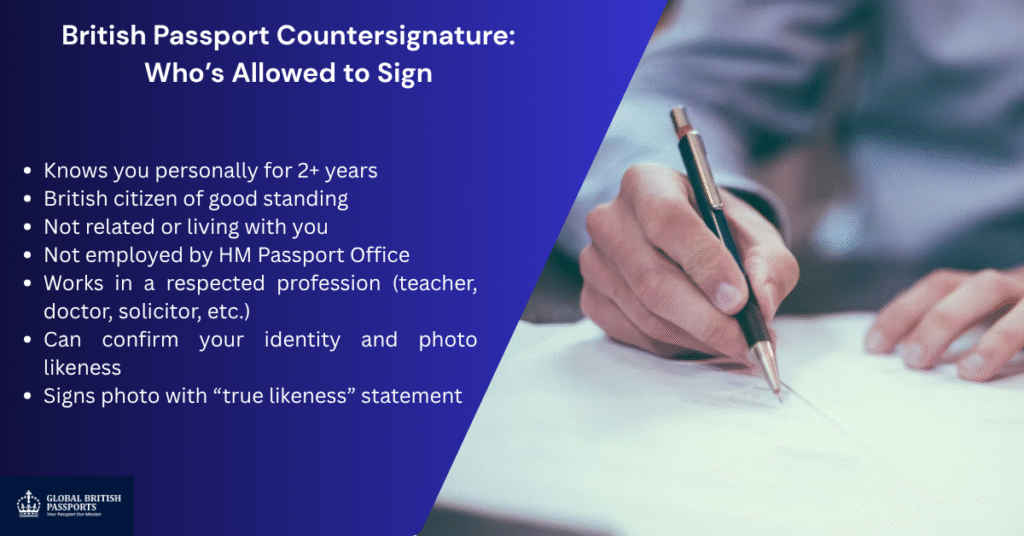
Applying for a British passport is usually straightforward, until you reach the section asking for a British passport countersign. That’s often where people pause, unsure who qualifies to sign, what’s required, or why this step matters. It may seem like a small detail, but getting it wrong can cause delays or even rejection. The countersignature step helps confirm your identity and ensure your application is genuine. Yet many applicants struggle to find someone who meets the criteria or end up choosing someone ineligible.
Key Takeaways:
- A British passport countersignature is required mainly for first-time applicants or when identity confirmation is necessary, ensuring your application is genuine.
- The countersignatory must be a reputable professional who has known you personally for at least two years and meets specific eligibility criteria.
- Choosing the right person and following the proper signing process can prevent common countersigning issues and delays in your passport application.
This guide explains everything you need to know about who can countersign a UK passport application, how the process works, what to write, and how to avoid common countersigning passport problems.
What is a British Passport Countersignature?
A British passport countersignature is a signed declaration from someone who can confirm that you are who you say you are, and that your photo is a true likeness.
It’s required by HM Passport Office in certain cases, mainly to add an extra layer of identity verification. Not everyone needs one, but if you’re applying for your first British passport, replacing a lost one, or changing significantly in appearance, this step becomes essential.
Your countersignatory doesn’t need to know every detail about your life. They’re simply vouching that they’ve known you personally and that your application is legitimate.
When Do You Need a Countersign for a British Passport?
You’ll need a countersign for your passport application if:
- You’re applying for your first adult passport.
- You’re applying for a child’s passport for the first time.
- You’re replacing a lost, stolen, or severely damaged passport.
- Your appearance has changed so much that you’re not easily recognisable from your previous passport photo.
If you’re simply renewing an adult passport and still look much the same, you won’t usually need one.
Who Can Countersign a UK Passport Application
This is the most important and often the trickiest part of the process. The person who countersigns your application must meet professional and personal requirements set by the HM Passport Office.
Professional Requirements
Your countersignatory must be “a person of good standing in the community” or work in a recognised profession. This includes:
- Accountant, banker, or solicitor
- Teacher, lecturer, or school official
- Doctor, dentist, nurse, or pharmacist
- Police officer, civil servant, or local government officer
- Engineer, scientist, or journalist
- Clergy member, charity worker, or company director
| Important Note: While doctors are an accepted profession, HM Passport Office no longer accepts your own GP as a countersignatory due to high demand on medical practices. However, if you have a friend who is a doctor and has known you personally for 2+ years, they can still countersign. |
They should be someone traceable and reputable in their line of work. If you're applying from within the UK, your countersignatory must hold a current British or Irish passport and live in the UK. If you're applying from overseas, your countersignatory can hold a British, Irish, EU, US, or Commonwealth passport. If they have a US, Commonwealth, or EU passport (other than British or Irish), you must include a colour photocopy of their passport photo page with your application. Applications process faster when the countersignatory holds a British or Irish passport.
Personal Requirements
They must also:
- Have known you personally for at least two years
- Not be related to you by birth, marriage, or partnership
- Not live at your address
- Not work for HM Passport Office
For child applications, the countersignatory must have known the parent or guardian for at least two years and be able to confirm their relationship with the child.

How the British Passport Countersignature Process Works
Here’s a step-by-step breakdown of how the British passport application countersignature process works:
Step 1: Choose the right person
Make sure your chosen countersignatory meets all criteria and is willing to take responsibility or confirming your identity.
Step 2: Signing the application form
If you’re applying with a paper form, your countersignatory fills out the declaration confirming they’ve known you for at least two years. For online applications, they’ll receive a secure link to confirm your identity digitally. The process is quick and straightforward, and Global British Passports can guide you through each step to ensure everything is completed correctly.
Step 3: Contact details
Your countersignatory’s full name, occupation, and address will be included in your application. We recommend choosing someone who is available and willing to respond promptly if contacted for verification.
What to Do If You Can’t Find Anyone to Countersign Your Passport Form

One of the most common countersigning passport problems is not having anyone suitable to sign. This is especially common for people who’ve recently moved, live abroad, or have limited local contacts.
Here’s what you can do:
- Ask a colleague or employer who meets the requirements.
- Reach out to a teacher, GP or community leader who knows you personally.
- If you’re applying from overseas, we can help you find a suitable countersignatory. In some cases, your local British embassy or consulate may also be able to suggest professionals who meet the eligibility criteria.
Do You Need a Countersignature for Online Applications?
Even though most people now apply online, the same rules still apply. If your application requires a countersignature, we’ll guide you through the process and ensure it’s completed electronically as requested.
Your chosen person will receive an email with a secure link to complete the digital countersignature. They’ll confirm how long they’ve known you, their occupation, and that your photo is a true likeness. If everything checks out, your application continues as normal. There’ll be no printing or mailing needed.
Stay informed about upcoming rule changes that may affect your future trips — see our detailed overview of the 2025 EU travel alert.
Tips to Avoid Delays with Your Countersignature
- Check eligibility first. Don’t assume someone qualifies; verify their job and relationship to you.
- Communicate clearly: Make sure your countersignatory knows what to expect and responds quickly if contacted.
- Apply early. If there’s an issue, you’ll have time to fix it without missing your travel plans.
Renewing your British passport abroad? Learn more about common renewal mistakes for a smoother process.
Frequently Asked Questions
Do I need a countersignature for a passport renewal?
In most cases, no. You only need one if your appearance has changed significantly and your identity might not be clear from your previous passport photo, or if your previous passport was lost, stolen, or damaged.
What happens if my countersignature is rejected?
If your countersignature isn’t accepted, for example, if the person doesn’t qualify or can’t be reached, you’ll be asked to provide a new one within a set timeframe. We’ll help you choose someone reliable who meets all the requirements to avoid delays with your application.
Can my employer countersign my passport application?
Yes, your employer can act as your countersignatory if they’ve known you personally for at least two years and meet the professional criteria. However, your direct manager or HR representative must still meet the same eligibility requirements, as simply working together isn’t enough if they haven’t known you that long. We can help you confirm whether your chosen person qualifies before you proceed.
Can someone living abroad countersign my passport application?
Yes, if you’re applying from overseas, your countersignatory can live outside the UK, but they must still be a British citizen who meets the professional and personal criteria. We recommend choosing someone who is easy to contact by email or phone, as verification may take longer for those based abroad.
Conclusion
The British passport countersignature is one of the small but essential steps that can make or break your application. It’s there to confirm your identity and protect the integrity of the UK passport system, not to make life harder.
Once you understand who can countersign a UK passport application and how the process works, it becomes straightforward. Choose the right person, follow the proper format, and double-check every detail before submitting. At Global British Passports, we provide clear guidance and helpful information to make the process easier and help you avoid common countersigning mistakes or delays.
 back to blog
back to blog